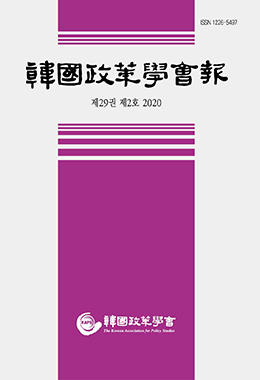본 연구는 한국 정책과정에서 의제설정의 거시동학(macrodynamics)을 실증적으로 밝히기 위해 대통령, 의회, 언론, 대중의 상대적 영향력과 상호작용의 양태가 변화하고 차별화되는 과정을 분석하였다. 이를 위해 대통령과 의회를 포함한 정부행위자, 언론과 정부행위자, 대중과 정부행위자 및 언론의 관계로 단계적으로 확장하여 논리적 근거를 정리하고 이들의 상호작용을 수직적 및 수평적 차원에서 거시적으로 조망할 수 있는 연구의 분석틀을 구성하였다. 경험적 분석을 위해 경제, 교육, 국토개발, 노동, 보건복지의 5개 정책영역에서 주요행위자들이 표명하는 관심의 변화를 측정하여 시계열 데이터를 구성하고 이들의 상호영향을 벡터자기회귀(Vector Autoregressive·VAR) 모형과 충격반응함수(Impulse Response Function·IRF) 시뮬레이션 및 그랜저(Granger) 인과성 검정으로 분석하였다. 분석의 결과는 의제설정의 거시동학이 정책영역에 따라 차별화되면서 주도적 행위자와 다른 행위자의 관심이 수평적·수직적 차원에서 충격-반응의 다양한 상호작용을 통해 정책의제를 형성해 가는 인과적 과정을 밝혔다.
This study seeks to enhance our understanding of the macrodynamics of agenda setting by analyzing the causal mechanism through which the relative influence and interactive patterns are differentiated across policy domains among such major actors as president, legislature, media, and the mass public in Korea. For this purpose, a conceptual framework is formulated to highlight macro-interactions among governmental actors, media, and the mass public in horizontal and vertical dimensions. A set of original time-series data on agenda attentions are constructed in major domestic policy domains including economy, education, land development, labor, and public health and welfare. The causal dynamics in agenda setting are empirically investigated by using Vector Autoregressive(VAR) model, Impulse Response Function(IRF) simulation and Granger causality test. The results collectively show that the major actors’ impact-response patterns in their agenda attentions substantially vary across policy domains through diverse horizontal and vertical interactions, especially top-down and bottom-up flows of influence surrounding the legislature rather than president, despite the historical legacy of strong executive power in Korea.


